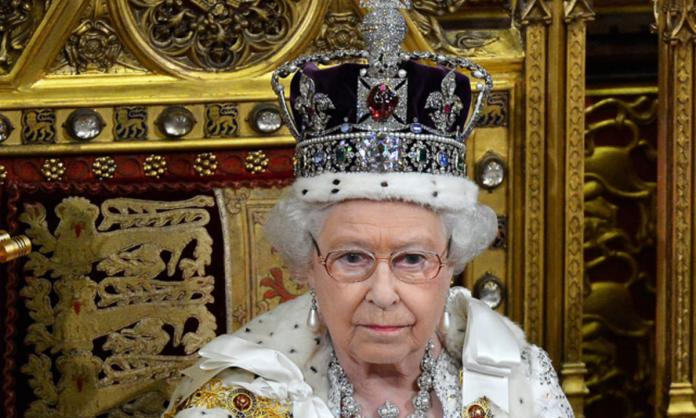The announcement of Queen Elizabeth’s death has resulted in a torrent of official condolences from around the world. All have praised her supposed talents and service to the nation and the Commonwealth throughout her seven decades on the throne.
The Queen, in fact, had two chief talents. First was her ability to be born into the right family, resulting in her elevation to the crown at age 25. The second was her ability to avoid actual work during her 96 years of luxury. The Queen was a bludger, a first-class bludger who contributed nothing to the common weal and represented all that is reactionary about the society in which she and her parasitic brood exist.
The sheer extent of royal sponging off the public is something to behold.
Last year, the monarchy cost the British public £88 million, more than double the £42 million leeched off the people in 2017. On top of that, the Queen had a further $500 million in personal assets, including financial investments, artworks, tapestries, furniture, ceramics, gold and silver plate, arms and armour and jewellery, not to mention Sandringham House and Balmoral Castle. All that personal wealth now passes on to King Charles.
Most of the income the royal family receives is tax-free, although the Queen and Prince Charles conceded under public pressure a few years ago to make voluntary contributions in lieu of tax.
The royals do not lift a finger to help themselves or others. 1,200 staff at Buckingham Palace cater to their every whim, while another 450 staff maintain the royal estates. Prince Charles alone has 132 personal staffers. The British working class also cover the cost of the royal train (£200,000 a year), the royal helicopter (£3 million) and the estimated £200 million for the building of a new royal “yacht” due to launch in 2025. Feeding the royal family and providing them with drink costs another £1.4 million
All this while more and more British people suffer from malnutrition and charities are run off their feet handing out food parcels. When the royals are racking up an annual electricity and gas bill of £2 million, tens of thousands of their subjects die each winter for lack of heating. The best medical care in the world kept the Queen and Prince Philip alive well into their 90s, while the working class in Manchester, Liverpool and Newcastle die on average two decades earlier. This is class warfare, and the royal family have enjoyed being on the winning side.
The royal family have leeched off not just the British people but their imperial subjects too. The Queen ascended to the throne in 1953 to rule over an extensive empire at the time. This empire was built off the backs of millions of Irish, Arabs, Africans and Asians. Every piece of stupendous jewellery, every crown and coronet, every exotic bauble sitting in the royal collection was made from the sweat and sorrow of those masses of downtrodden colonial subjects.
Most of the colonial empire was gradually dismantled during the Queen’s reign. But decolonisation did not occur as any result of benevolence by the royal family. In many cases, the colonies had to fight for independence against brutality meted out by those who fought in the Queen’s name. As commander in chief of the British armed forces, the Queen was complicit in this brutality. The victims include the hundreds of thousands of Kenyans and Malayans herded into concentration camps in the 1950s, their villages destroyed and their families brutally tortured or butchered by British armed forces and their local collaborators. They include the hundreds of Egyptians killed in 1956 when Britain invaded Egypt to try to take back the Suez Canal. They include the thousands of people on the British protectorate of Diego Garcia in the Indian Ocean who were thrown off the island in the late 1960s to make way for a US military base.
Closer to home, Irishmen and women were shot in cold blood on the streets by the Queen’s Paratroop Regiment and Ulster Defence Regiment, interned without trial, or suffered agonising deaths on hunger strike in the Queen’s prisons.
The havoc unleashed by the Queen’s military continued in the 1990s and 2000s with the sanctions imposed on the people of Iraq following the first Gulf War in 1991, followed by the 2003 invasion and occupation, which cost hundreds of thousands of lives. Did the Queen say one word of condemnation against those who butchered others in her name and under her command? Never. God save our noble Queen, indeed.
Despite her many crimes and her lifetime of parasitism, the Queen remained popular in Britain. The press gave her a free ride. At the start of her reign, the press reliably hushed up the misdemeanours of the royal family. Things changed in the 1980s, and most of the royal family became fair game. It was not like the media had to search hard for offensive behaviour. Her husband’s racist “jokes” soon became public knowledge. Her mother’s wastrel ways, blowing a fortune on gambling and drink, her not-so-closet Nazism and her penchant for calling Black people “nig-nogs”, also made it into the press.
Then there was her sister Margaret, whose playgirl lifestyle in London and the West Indies was covered in salacious detail by the press (although rather less was made of her anti-Semitic, racist and deeply reactionary prejudices—Margaret once told the Mayor of Chicago that “the Irish are pigs, all pigs”).
Charles, too became rich fodder for the media which revealed that the incoming King is a crank who talks to trees, wants to be reincarnated as Camilla’s tampon and in any sensible society would not be allowed anywhere near the seat of power. Prince Harry’s Nazi regalia, a little joke among friends, also made it to the tabloids’ front pages, as did Prince Andrew’s involvement in Jeffrey Epstein’s circle of alleged sexual abusers.
But the Queen was off limits. She was entirely unaccountable for her actions, never questioned by the press, so the rank born-to-rule attitudes drummed into her from her earliest age and which she presumably absorbed like a sponge were never exposed to public scrutiny. But there was probably also some understanding by the press that at least one member, the most senior, had to be off limits to preserve the royal family’s mystique.
It is common to dismiss the royal family with all their divorces and foolishness as just another soapie, not to be taken too seriously. But that is a mistake. It’s not just that this soapie costs the British public tens of millions of pounds every year. The monarchy embodies all the reactionary values of the capitalist order in Britain, in particular the idea that certain people are born to rule and that low-born people should respect their betters. The more these ideas are taken up by the people, the less likely they are to act against the grotesque injustice that prevails in Britain. Only this can explain the decision, for example, by the rail and communication workers’ unions to cancel strikes planned in coming days out of respect for the official mourning. This tragic misjudgement will only benefit the shareholders and chief executives of big business.
While the idea of a “natural order of society” was born out of the feudal order and challenged by the great democratic movements of the last two centuries, it remains vital for capitalism in Britain still today. The Conservative party in particular has long maintained a voting base in the working class playing on support for Queen and Empire.
If the monarchy offends because it upholds elitism and violates basic democratic principles, it also perpetuates British chauvinism. The royal family, or, more accurately, the carefully airbrushed version of the royal family that we are allowed to see, is an essential pillar of “Britishness”. That the House of Windsor is more German than British is usually swept under the carpet to uphold the notion that the monarchy is the bedrock of the British nation. The royal family reproduces racism, an essential component of the British empire and central to British imperialism today.
The royal family has historically embodied a particular role for women: pretty and virginal before marriage, brood mares thereafter. So too the idealisation of the nuclear family and the primacy of the first-born son. The royal family also embodies the dominance of Christianity, in particular the Protestant ascendancy, in a country where practising Christians are a small minority.
Some of the most reactionary ideas associated with the royal family have been reformed in line with social expectations and the changing role of women in broader society. Divorce and re-marriage are no longer taboo. But no matter what concessions are made to the reality of life in Britain today, this does not alter the fact that the royal family represents the distillation of every appalling conservative social and political prejudice in Britain. The continuing reactionary attitudes surrounding the royal family were evident in the disgust shown towards Prince Harry’s marriage to Meghan Markle—a Black royal baby was beyond the pale.
The media will in coming days show endless footage of people mourning the Queen’s death. But the kind of public sorrow we will witness results from constant conditioning by a willing media. In recent decades, the royal family’s reputation has steadily diminished as its greed and immorality have come into the public eye. This was obvious last year when British television stations had to scrap plans for back-to-back coverage of Prince Philip’s death because viewers switched off in their droves. When tens of thousands were dying of COVID-19 due to government neglect and their fate ignored by the press, the public ignored the official mourning. The political establishment will use the Queen’s death to refurbish the monarchy's reputation, but it’s not clear King Charles will help their cause.
Monarchists sometimes try to promote the monarchy as the showpiece of the British state, a mere ornament. But it is much more than just a drawcard for tourists. The monarch of the day still has expansive powers untouched by more than a century of parliamentary democracy. As commander in chief of the armed forces, the monarch has the right to recruit, appoint commissioned officers and establish agreements with foreign governments to station British armed forces on their soil. The courts cannot challenge their control over the armed forces. As sovereign, the monarch also has the right to declare war or peace, recognise foreign states, form international treaties, annexe territory and grant or withdraw passports.
At the home of the “mother of parliaments”, the monarch has the power to prorogue parliament, appoint or dismiss governments, declare general elections and appoint the prime minister. The prime minister of the day is also expected to attend weekly meetings with the monarch to discuss political affairs. In a political crisis, the monarch has the right to take “all reasonable steps to preserve the King’s peace”, that is, to declare martial law.
When challenged by this affront to democracy, monarchists argue that these powers are never exercised without the elected prime minister’s consent. But this was no comfort to the democratically elected Whitlam government, sacked by the Queen’s representative in 1975.
After a lifetime of bludging off the public, Queen Elizabeth is gone at last. But the monarchy is not about to fade away. King Charles will try to play the same role as his mother: giving an air of legitimacy to the capitalist order in Britain. The ruling class outside Buckingham Palace is not about to give up on the monarchy. Social revolution is needed to eliminate these parasites and wastrels.











